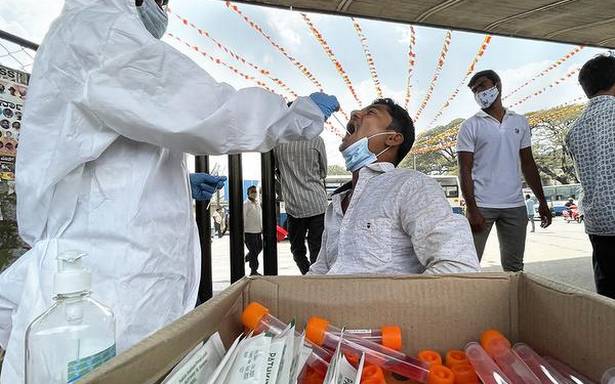This is mainly because of loss of appetite and change in eating habits during and after COVID
While it is known that COVID-19 can worsen existing diabetes and also trigger new onset of the lifestyle disease in recovered patients, doctors are now seeing post-COVID hypoglycaemia (blood sugar level less than 70 mg/dL) among patients. Doctors say many patients are reporting low sugar levels 10 to 15 days after recovering.
Haleema Yezdani, a diabetologist who has been teletriaging and teletreating COVID-19 patients through Project StepOne, said she has been seeing many patients with complaints of weakness a fortnight after recovery. “On checking their random blood sugar level is around 70 mg/dL. This is mainly because of loss of appetite and change in eating habits during and after COVID. In this third wave, severe throat pain is a common symptom and people are unable to eat,” she said.
“We had so far seen many non-diabetic patients reporting symptoms of diabetes post COVID and diabetic patients with sudden spikes in their blood sugar levels. But post-COVID hypoglycemia is something new. People should consume healthy food at regular intervals post-COVID,” she said.
Abhijit Bhograj, Consultant Endocrinologist at Manipal Hospital (Hebbal), is seeing patients with post-COVID hypoglycemia among both diabetics and non-diabetics. He attributed it to changes in eating patterns. “People are either eating less or not eating on time when on diabetes medication or eating only carbs without any fibre/ protein component during and post infection,” he said. “Some antibiotics can also cause low sugar when combined with older generation diabetes medication,” he added.
A. Sharda, consultant endocrinologist at Manipal Hospital (Millers Road), said she has seen post-COVID hypoglycemia in patients, especially if they are on insulin therapy. “We have also seen non-diabetic patients presenting with hypoglycemia two weeks after COVID. Some people have also reported hypoglycemia for ten days post COVID vaccination which was resolved with dietary supplements,” she said.
Other complications
Brunda M.S., Consultant, Internal Medicine, at Aster CMI Hospital, said some patients who recovered from acute COVID infection are also reporting hair fall and headaches. “COVID can affect various organs of the body and once recovered from the infection the body uses all the energy and nutrition to replenish the damage done,” she said.
N.K. Venkataramana, Founder Chairman and Director Neurosciences at Brains Hospital, said neurological complications are the second common post-COVID. “This is because the SARS-CoV-2 virus has the predilection to affect the lungs and the brain due to the presence of S2 receptors in both these areas. As a result the virus can affect the brain and the nervous tissues and cause a variety of complications,” he said.
“Nearly 30% of patients develop vague symptoms like heaviness of head, inability to concentrate, lack of focus, disturbed sleep and lack of drive, all put together a syndrome called brain fog. These patients require proper evaluation and symptomatic treatment, lifestyle modification which includes healthy diet, adequate sleep, moderate exercise and avoidance of alcohol and smoking and titration of pre-existing medications,” the doctor said.
Source: Read Full Article

